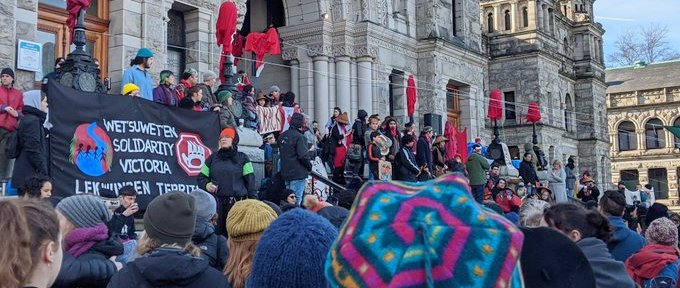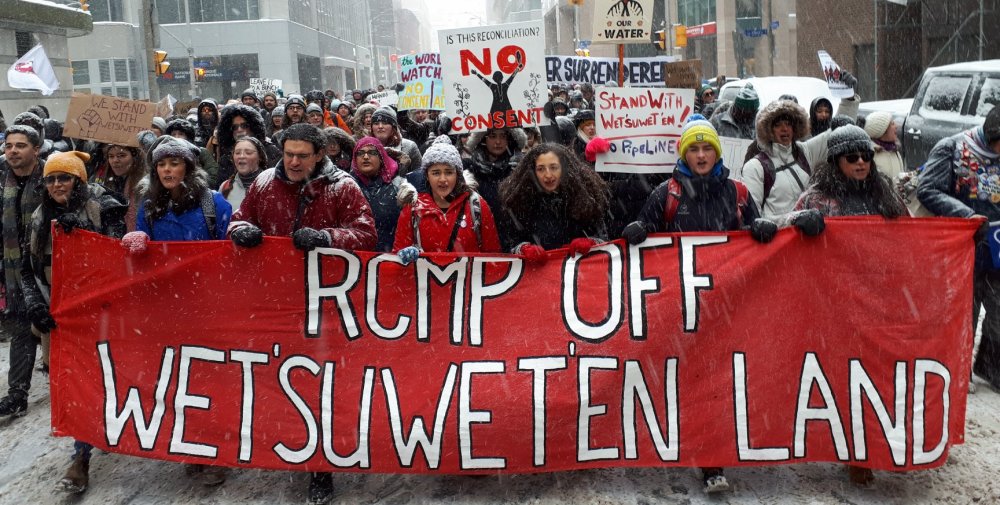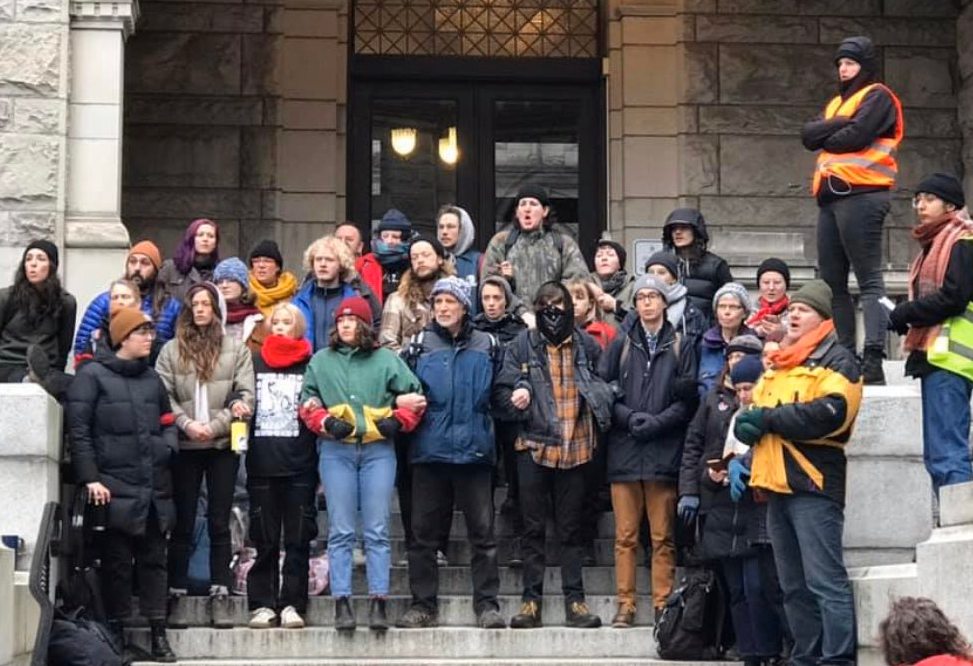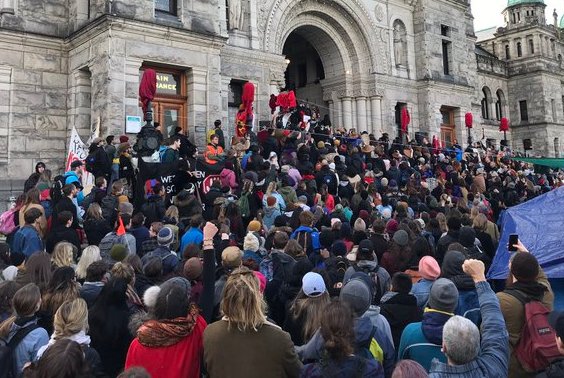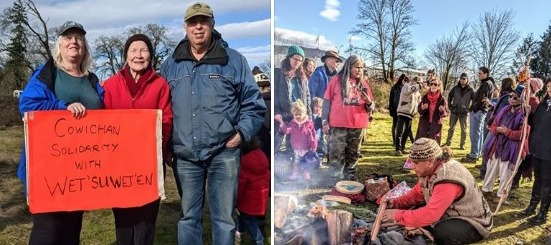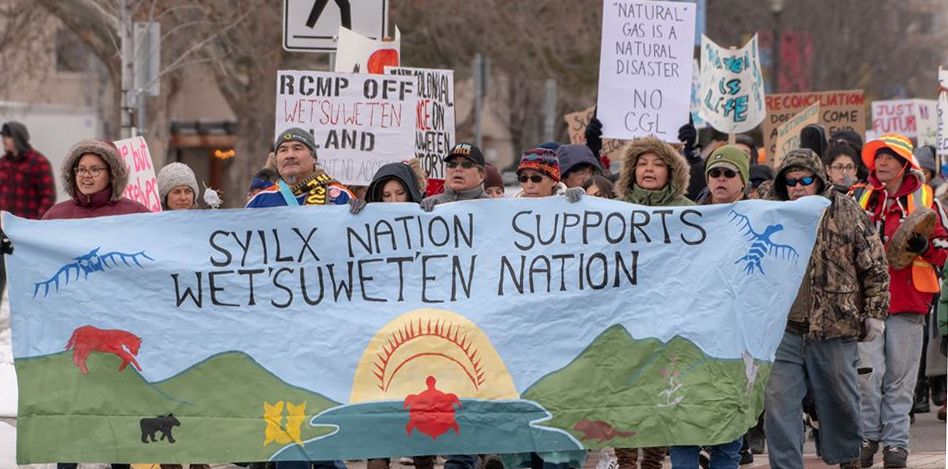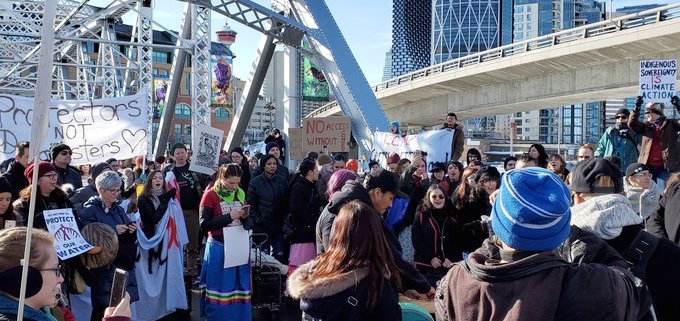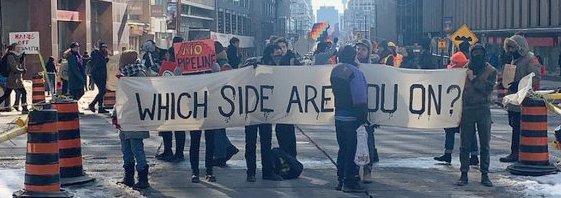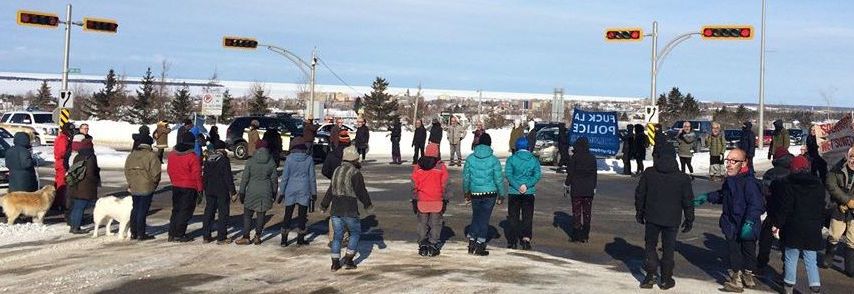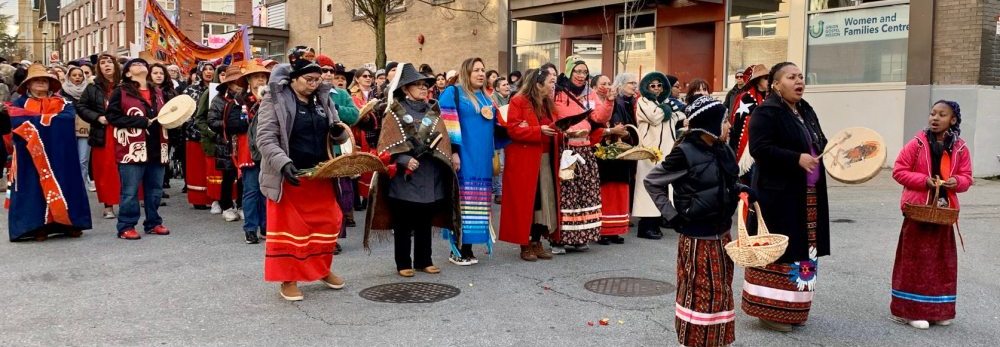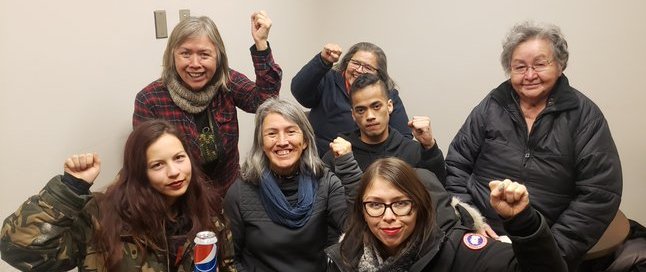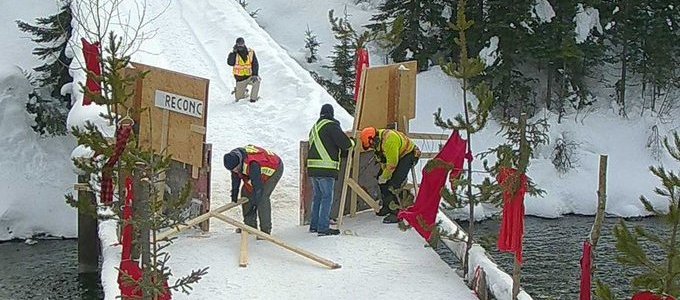
|
February 15, 2020 - No. 4 Affirm
Indigenous Sovereignty and Rights! Standing
With the
|
|
|
Federal and BC Provincial leaders keep repeating that Canada is a country of the rule of law, as if such a declaration does anything to address the growing opposition to the refusal of both levels of government to meet with the Wet'suwet'en hereditary chiefs or justifies the deployment of heavily militarized RCMP to remove Wet'suwet'en people from their own territory. Actions of solidarity and civil disobedience, including road, port, ferry and rail blockades, and the temporary occupation of offices of Members of Parliament (as well as of Members of the Legislative Assembly in BC), have taken place right across the country. On February 11, the day of the Throne Speech, hundreds of people, including a large number of youth, occupied the entrances of the BC legislature, demanding that the government of British Columbia end the RCMP assault and occupation and negotiate a peaceful resolution to the conflict with the Wet'suwet'en hereditary leaders.
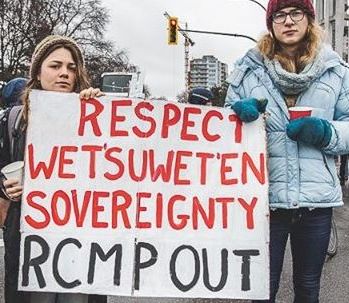 At a press
conference the day after the mass demonstration, BC
Premier John Horgan insulted Indigenous people defending their
hereditary rights, and all Canadians, saying "I am going to
continue to work with those people who want to make progress, and
they are legion and far outnumber those who are preferring
instead to focus on grievances." Like the old colonial rulers, he
gives himself the right to define progress, in this case
pipelines and LNG, then dismiss and criminalize anyone who
disagrees. The message is clear -- if the government's actions to
serve foreign investors, who want the resources and the land and
the labour of British Columbians at any cost, cause you harm or
violate your rights, too bad, "my government" is concerned with
"progress," not your "grievances." Prime Minister Justin
Trudeau's role thus far has been to claim that this is a
provincial matter and he has "full confidence in the NDP
government in British Columbia to move forward in the correct
way."
At a press
conference the day after the mass demonstration, BC
Premier John Horgan insulted Indigenous people defending their
hereditary rights, and all Canadians, saying "I am going to
continue to work with those people who want to make progress, and
they are legion and far outnumber those who are preferring
instead to focus on grievances." Like the old colonial rulers, he
gives himself the right to define progress, in this case
pipelines and LNG, then dismiss and criminalize anyone who
disagrees. The message is clear -- if the government's actions to
serve foreign investors, who want the resources and the land and
the labour of British Columbians at any cost, cause you harm or
violate your rights, too bad, "my government" is concerned with
"progress," not your "grievances." Prime Minister Justin
Trudeau's role thus far has been to claim that this is a
provincial matter and he has "full confidence in the NDP
government in British Columbia to move forward in the correct
way."
Ronald Wright, author of Stolen Continents: Conquest and Resistance in the Americas, in a letter to the Globe and Mail published on February 13, cogently explains the essence of the matter in the increasingly heated confrontation between Indigenous demonstrators and their allies, and those who want to get on with pipeline construction and what is called economic development. Wright makes the important point that the Wet'suwet'en territory the Canadian court has given developers permission to build across was never ceded to the Crown, so the court lacked authority to grant its permission. Furthermore, the elected band councils supporting the pipeline only have authority over the small reserves created by the Indian Act.[1] Wright points out:
"John Horgan should know better than to invoke 'the rule of law' in driving a pipeline through unceded Wet'suwet'en territory. Those same words were used by the Mulroney government during the 1990 Oka crisis. The question is: Whose law?
"Similar to the Mohawks, the Wet'suwet'en have never surrendered their ancient sovereignty as an independent people. Sovereignty can only be lost by conquest or treaty; unceded land has never lawfully become a part of Canada. Like the Mohawks, the Wet'suwet'en have a system of government that predates European occupation and is still alive. (Band councils merely run the small reserves set up under the Indian Act; any "permissions" they may give are worthless beyond those boundaries.)
"In landmark decisions of 1997 and 2014, the Supreme Court upheld Indigenous rights in British Columbia and said that unceded Wet'suwet'en territory may cover 22,000 square kilometres. That being so, no outside government or corporation should have the right to impose its will there. It seems that BC and the RCMP are the ones breaking the rule of law."
It is high time hereditary chiefs and Indigenous spokespeople stop being pushed aside whenever the Crown finds some economic use for their traditional territory, whether it be for mining, forestry, hydro dams, or pipelines.
At this time, the RCMP occupation is firmly in place and, on February 13, Coastal GasLink announced that work had recommenced on the pipeline. This is called upholding "the rule of law," even though it pours oil on the fire of opposition to the racist and colonial "might makes right" stand of the Trudeau and Horgan governments.
The RCMP has established an exclusion zone on Wet'suwet'en territory, all the way to the Unist'ot'en Camp at the 66 km point on the Morice River Forest Service Road and arrested 28 people. This is the road which is being used by Coastal GasLink to access the unceded Wet'suwet'en territory, where it is building a natural gas pipeline to bring fracked gas to the LNG Canada plant that is being built in Kitimat.
Meanwhile, Indigenous nations and other supporters of the Wet'suwet'en land defenders at Kahnawake in Quebec, Tyendinaga in Ontario, and in Manitoba have blocked rail lines, demanding that the RCMP be removed and that nation-to-nation negotiations take place. By the end of the day on February 13, national rail service had virtually been shut down and rail service to the Port of Prince Rupert in Northern BC and the West Coast Express commuter rail service from downtown Vancouver to the Fraser Valley disrupted.
Quebec Premier François Legault stated recently that the train blockades in support of the Wet'suwet'en must stop, with his old refrain about possible "propane shortages." This is precisely the modus operandi of the Canadian and Quebec institutions -- the latter being an integral part of the Anglo-Canadian colonial state -- that on issues of the fundamental rights of the Canadian, Quebec and Indigenous peoples, the answer of those who usurp political power is to criminalize those who defend their rights, to make their struggles a question of law and order.
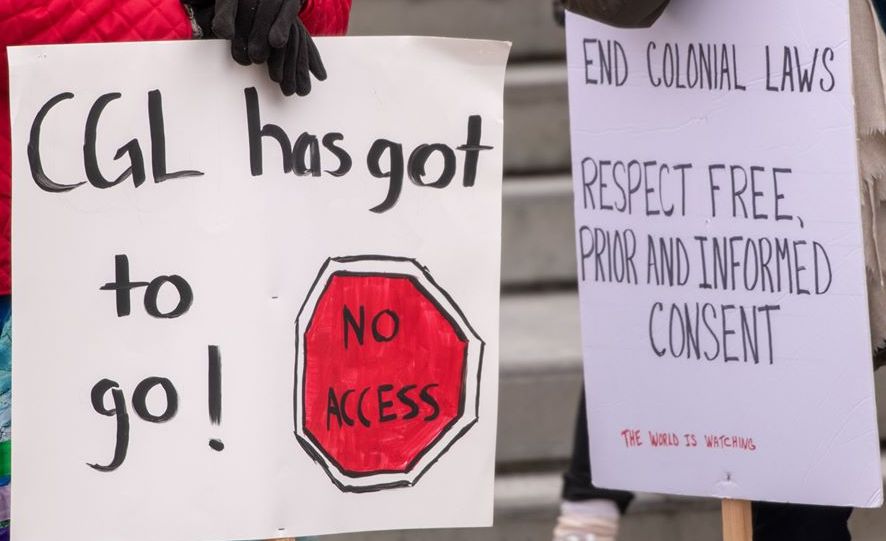 Under extreme
pressure from all quarters, including trade
unions, scholars, lawyers organizations, churches, the National
Farmers Union, journalists and civil liberties organizations, the
Trudeau government has pledged that Crown-Indigenous Relations
Minister Carolyn Bennett will meet with BC Indigenous Relations
and Reconciliation Minister Scott Fraser and Gitxsan and
Wet'suwet'en hereditary chiefs. The Gitxsan, whose territory is
adjacent to that of the Wet'suwet'en, have been blocking rail
traffic in and out of the Port of Prince Rupert. As well, federal
Indigenous Services Minister Marc Miller contacted the Mohawks of
Tyendinaga, who are blocking rail lines near Belleville, Ontario,
and arranged to meet with them.
Under extreme
pressure from all quarters, including trade
unions, scholars, lawyers organizations, churches, the National
Farmers Union, journalists and civil liberties organizations, the
Trudeau government has pledged that Crown-Indigenous Relations
Minister Carolyn Bennett will meet with BC Indigenous Relations
and Reconciliation Minister Scott Fraser and Gitxsan and
Wet'suwet'en hereditary chiefs. The Gitxsan, whose territory is
adjacent to that of the Wet'suwet'en, have been blocking rail
traffic in and out of the Port of Prince Rupert. As well, federal
Indigenous Services Minister Marc Miller contacted the Mohawks of
Tyendinaga, who are blocking rail lines near Belleville, Ontario,
and arranged to meet with them.
Prime Minister Trudeau echoed BC Premier Horgan in a statement issued following their call on February 13. Neither is interested in addressing the legitimate stand of the Wet'suwet'en hereditary chiefs that it is they who have to give consent for industrial development on their territory, and that neither BC nor Canada is upholding the rule of law -- provincial, national or international. The statement from the office of the Prime Minister states: "The Prime Minister and Premier discussed how freedom of expression is an important democratic right, but activity must respect the courts and act within the law. The Prime Minister and Premier also discussed how progress on both climate change and reconciliation must continue to be at the forefront of all government actions. Prime Minister Trudeau expressed the desire to work together closely toward a resolution as soon as possible. Both governments shared a commitment to meeting with Gitxsan Simgyget, Wet'suwet'en Dini Ze' and Ts'ake ze to engage in an ongoing dialogue."
The LNG Canada
project is the darling of Prime Minister
Trudeau and BC Premier Horgan who together boasted that it is the
largest foreign investment -- $40 billion -- ever undertaken in
Canada. So eager was the BC government to secure the investment
that in March 2019, the BC legislature created an 'incentive
package,' including tax exemptions and cheap electricity
totalling an estimated $5.35 billion, for a consortium of several
of the world's largest multinationals, among them Shell,
Petronas, PetroChina, Mitsubishi and Korean Gas. The NDP
government, which opposed the development of LNG in BC while in
opposition, has become the champion of the dangerous fracking
operations in northern BC, the construction of the pipeline
through unceded Indigenous territory without consent, the
building of the Kitimat liquefaction plant, and the --
increasingly unlikely -- prospect of a market in Asia for the
liquefied gas. Anyone who raises concerns about the damage to
Mother Earth, including the destruction of the land and water on
which the Wet'suwet'en depend, or how LNG for export contributes
to climate change, is dismissed as an enemy of progress.
The BC Civil Liberties Association and the Union of BC Indian Chiefs, supported by West Coast Environmental Law and Pivot Legal Society, have twice (January 29 and February 9) written to the Civilian Review and Complaints Commission for the RCMP asking for an investigation on the grounds that the implementation and enforcement of the RCMP exclusion zone in Wet'suwet'en territory is unlawful, spelling out what makes the RCMP actions unlawful.
The Prime Minister and Premier would be well advised not to speak in such a self-righteous way of the rule of law or freedom of expression while they are overseeing the violent occupation of Wet'suwet'en territory, the arrest of youth occupying a Cabinet Minister's office in an effort to get him to talk to them, and the criminalization of those who are exercising their right to express themselves.
The bold actions by the Wet'suwet'en to defend their rights and the actions being taken across the country to support them, by Indigenous and non-Indigenous peoples alike, show the modern democratic personality that is struggling to free itself from the confines of the anachronistic liberal democratic institutions imposed on them by the powers that be. The aspiration for just nation-to-nation relations between Canada and the Indigenous peoples is blocked by what Trudeau, Horgan, Canada's Minister of Transportation Marc Garneau and others are calling the "rule of law." This "rule of law" is the colonial rule enforced at the point of a gun. Canada's colonial relations with the Indigenous peoples, have no place. The people demand institutions which provide redress for the crimes committed against the first peoples. Governments that render service to private interests, necessarily negate the peoples' right to have a say in the decisions which affect their lives. To reduce this to an abstract rendering of rule of law is being debunked by life itself.
All Out to Stand with the
Wet'suwet'en Land Defenders!
All Out for People's Empowerment to Ensure Just
Nation-to-Nation Relations with the Indigenous Peoples!
Stop Pushing Hereditary Chiefs and Indigenous Spokespeople Aside!
Note
1.‘The Wet'suwet'en have never surrendered their ancient sovereignty,' Globe and Mail, Feb. 13, 2020.
(Photos: TML, R. Gillezeau, C. Smith, C. Hunt, B. Patterson)
Coast to Coast and International Actions Condemn the Violence of the Colonial Canadian State

Rally outside BC legislature January 7, 2020, the day after the RCMP
raid began on Wet'suwet'en territory.
As the armed occupation and removal of Wet'suwet'en Land Defenders from their unceded territory in northern BC enters its second week, actions in solidarity have increased throughout the country. Several actions, including the occupation of the steps of the BC legislature by Indigenous youth and supporters, have been ongoing since the RCMP raid on February 6.
When the BC legislature opened February 11 with the reading of the Throne Speech, the Union of BC Indian Chiefs (UBCIC) and others organized a mass rally to join the youth at the legislature and held a press conference.
In a press release February 10 the UBCIC states "The RCMP are carrying out a violent raid on unceded Wet'suwet'en territory under Provincial and Federal watch to enforce Coastal GasLink's injunction. Indigenous youth, the Union of BC Indian Chiefs, and allies, including [environmental non-governmental organizations], municipal, provincial and federal representatives, will gather in solidarity with the Wet'suwet'en nation. Speakers will respond to the unlawful escalation of the RCMP and violations of Wet'suwet'en law and Indigenous rights taking place under the orders of the injunction. They will also address the lands and waters at stake, and the responsibilities and roles of the province."
Among the actions that have taken place across the country are the following.
British Columbia
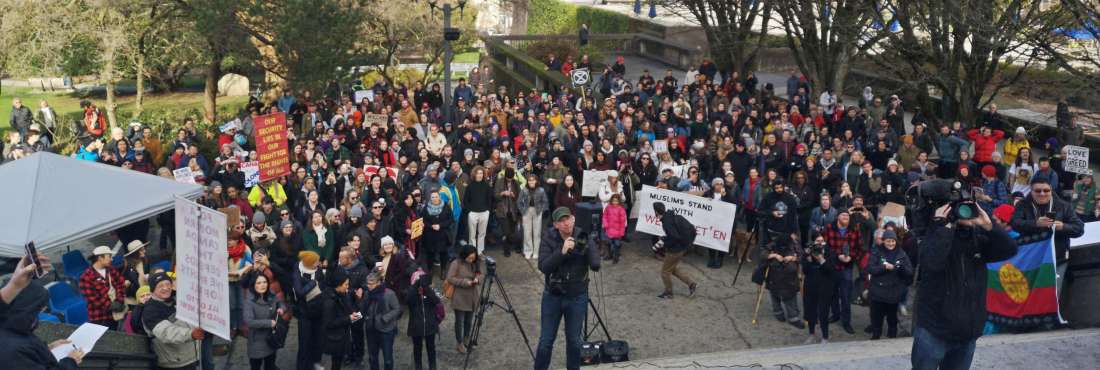
Vancouver, February 9, 2020
There have been rallies and demonstrations in large and small communities on Vancouver Island: outside the RCMP station in Campbell River on February 9, on the Inland Island Highway south of Courtenay on February 10, in Tofino, Courtenay and Nanaimo, as well as in Prince George and other cities and towns throughout the province.
On February 9, some 2,000 people rallied at Vancouver City Hall. "End Colonial Injustice! RCMP Out of Wet'suwet'en Territory," an article reprinted from the February 1, 2020 issue of TML Weekly, was widely distributed and well-received there. Following the rally, hundreds of people took to the streets to shut down the busy intersection of Broadway and Cambie.
Blockades were set up February 8 at the Port of Vancouver and Deltaport, which continued until the morning of February 10 when barricades were removed by police and 55 people were arrested. In Vancouver non-Indigenous volunteers had remained in the roadway outside the port to prevent Indigenous youth from being arrested. Later that day, learning of the arrests of a number of the women at the Unist'ot'en Camp, several hundred people again marched through the streets of Vancouver.
In New Hazelton, a community located west of Smithers, protesters blocked railways, affecting Canadian National Railway service to the Port of Prince Rupert.
Victoria, opening of BC
Legislature, February 11, 2020.
Cowichan, BC
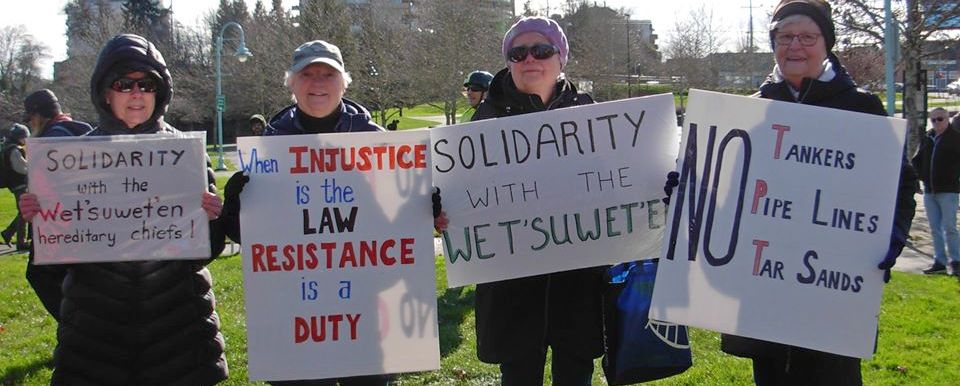

Nanaimo, BC
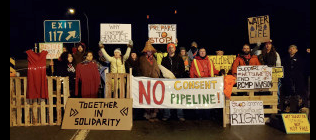
Comox, BC
Campbell River, BC
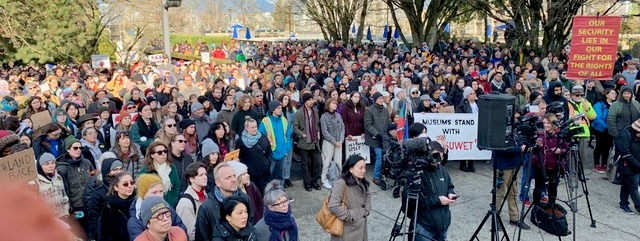
Vancouver rally, February 9, 2020.

Vancouver, Broadway and Cambie, February 11, 2020

Blockade of Port of Vancouver, February 9, 2020.

Blockade of secondary rail line,
Vancouver, February 11, 2020.
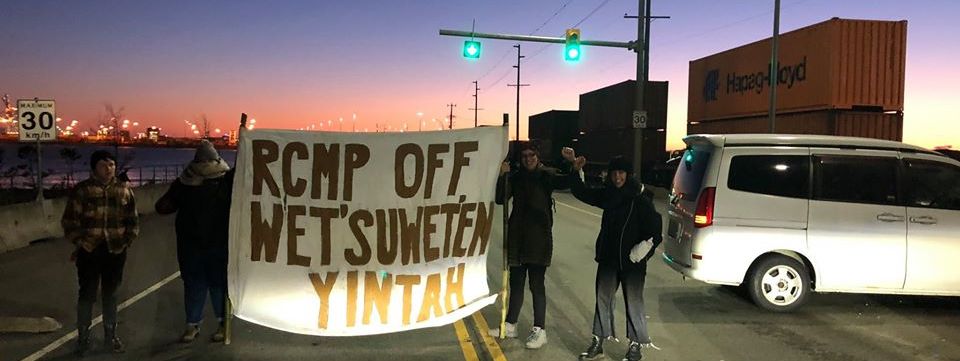
Blockade of container terminal, Delta, BC,
February 9, 2020.
Terrace, BC
Kelowna, BC

Kaslo, BC
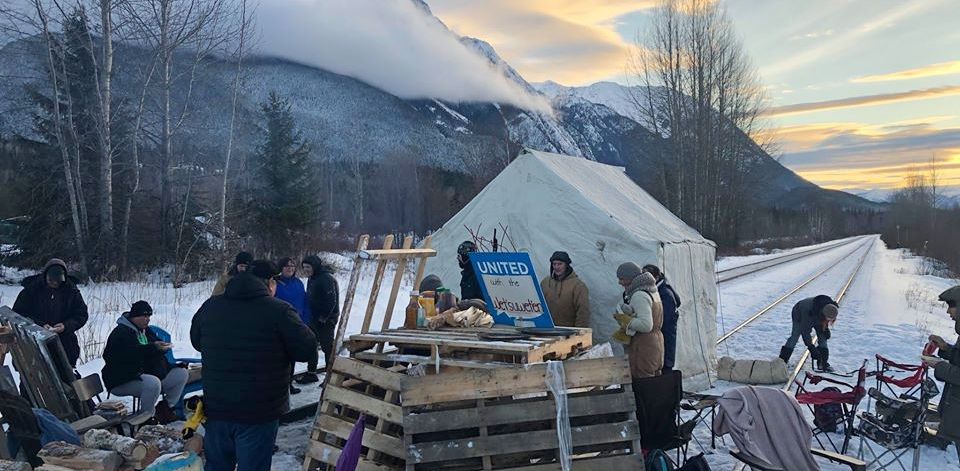
Blockade of rail line, New Hazelton, BC, February 8, 2020.
Alberta
Students at the University of Alberta in Edmonton, on February 10, staged a walkout and rally on the campus, then moved to Enbridge Place in downtown Edmonton to join a rally held by Indigenous Youth for Wet'suwet'en.
People blocked the Reconciliation Bridge in Calgary on February 10 as part of a rally in support of the Wet'suwet'en hereditary chiefs.
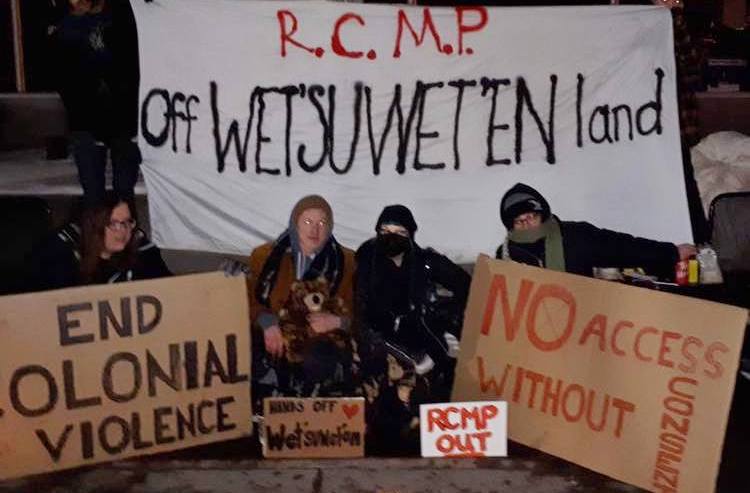
Calgary, AB
Saskatchewan
A group of Wet'suwet'en supporters blocked the Albert Street bridge in Regina on February 8.
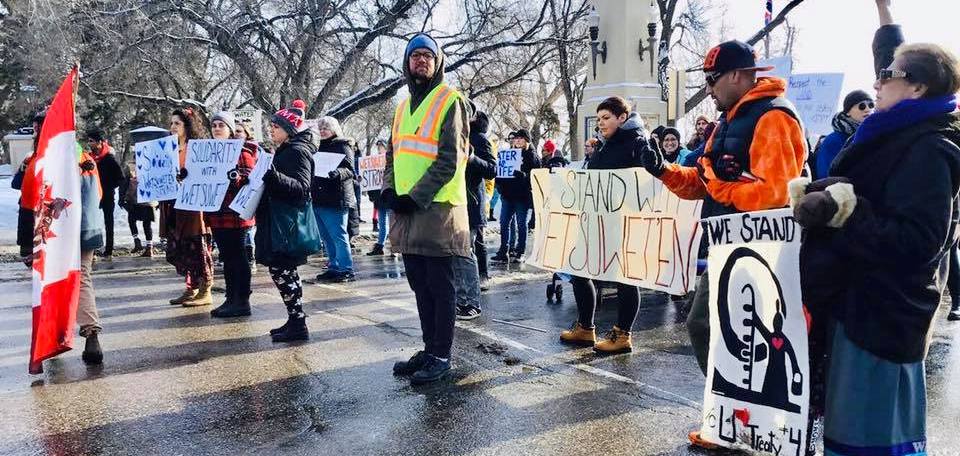
Regina, SK
Manitoba
Youth from Winnipeg have been occupying the constituency office of Minister of Northern Affairs Dan Vandal since February 4. On February 7 traffic on Portage Avenue was shut down for a rally outside the RCMP office. Another rally, on February 10, took over four intersections in downtown Winnipeg.


Winnipeg, MB, February 10, 2020
Ontario
Passenger and freight rail traffic between Toronto and Montreal and between Toronto and Ottawa has been stopped in Tyendinaga Mohawk Territory near Belleville since February 6 despite an injunction obtained by CN from the Ontario Superior Court of Justice in Toronto. The injunction was served to demonstrators by CN police on February 8, however, as of February 14 it has not been enforced by the Ontario Provincial Police.
Indigenous youth and allies have occupied the Ministry of Justice building in Ottawa, demanding a meeting with Justice Minister David Lametti. A news release issued February 10 said the youth and their allies will continue their occupation "until RCMP stand down, the demands of the hereditary leadership of the Wet'suwet'en peoples is respected, and all land defenders are released and cleared of all charges."
Indigenous and non-Indigenous youth occupied the Toronto constituency office of Crown-Indigenous Relations Minister Carolyn Bennett, February 10-11.
Demonstrators, at a solidarity rally in Waterloo,
occupied the offices of MP Bardish Chagger, Minister of Diversity and
Inclusion and Youth, on February 10 to show support for the
Wet'suwet'en nation following a rally earlier in the day at the
University of Waterloo.

University of Windsor student and
faculty walkout and march, February 13, 2020, for a time blocked off
access to Ambassador Bridge to the USA.
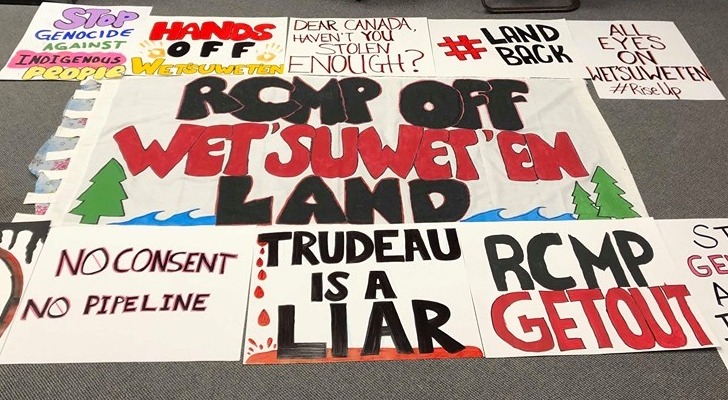
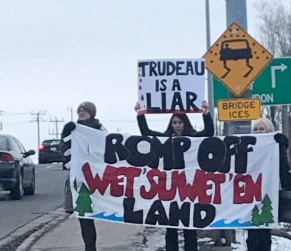
Brantford, ON
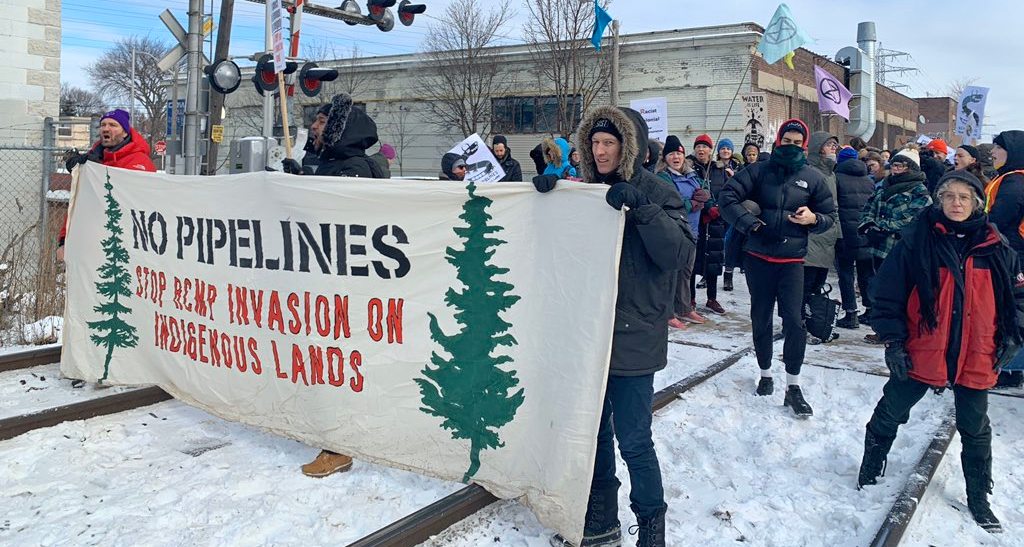
Rally of hundreds of people block rail line in Toronto, February 9,
2020.
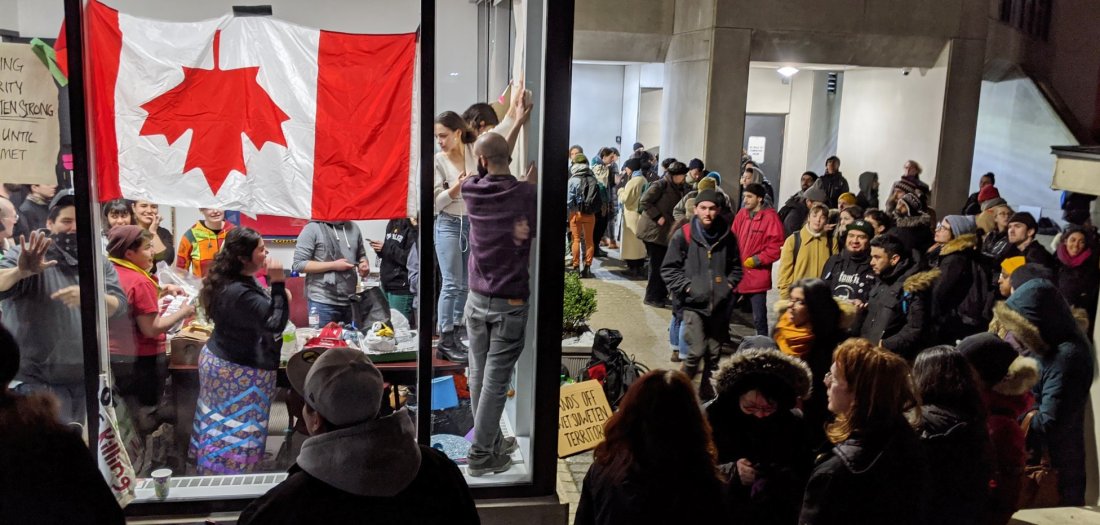
Occupation of Minister of Crown-Indigenous Relations Carolyn Bennett's
office,
February 10, 2020.
Toronto, ON

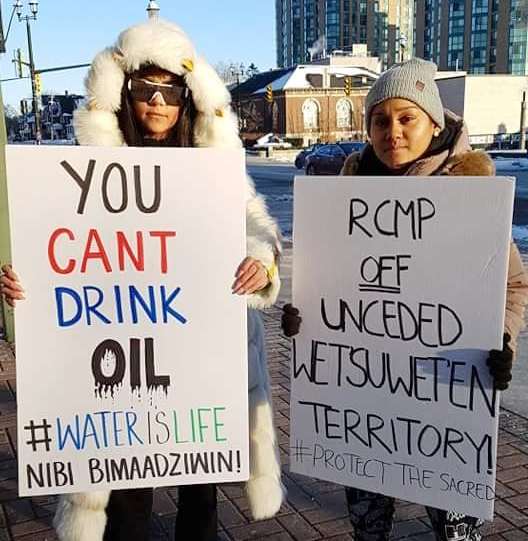
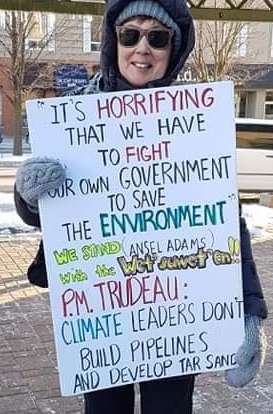

Barrie, ON
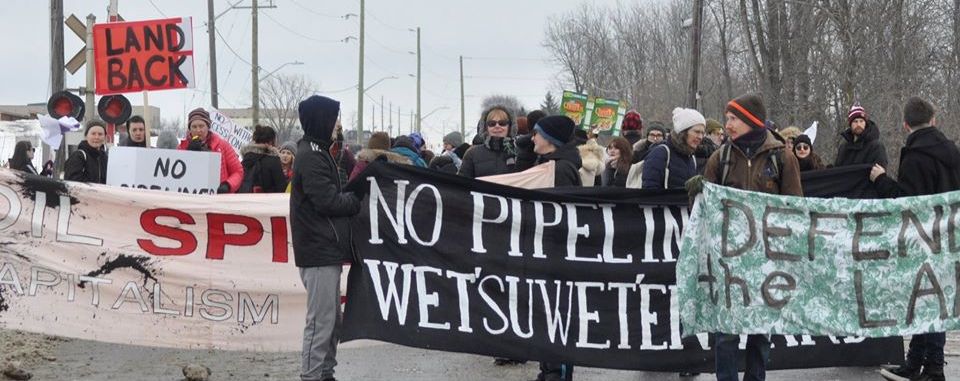
Kingston, ON
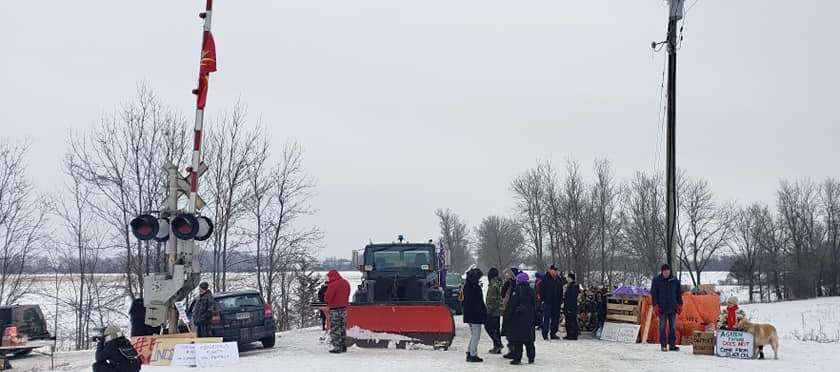
Rail blockade, Tyendinaga, ON, February 9,
2020.
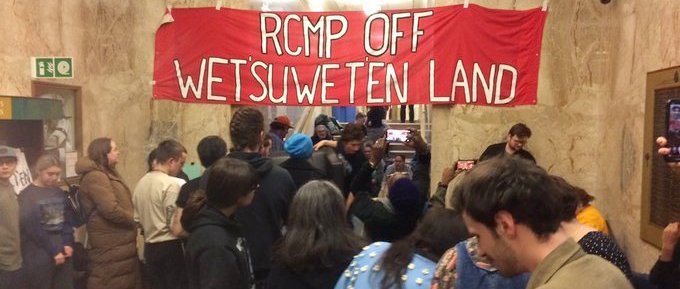
Occupation of Ministry of Justice offices,
Ottawa, ON, February 10, 2020.
Quebec
Since February 8, people from Kahnawake Mohawk territory have been blocking commuter rail tracks, leading to the suspension of service on the Candiac line, which is overseen by the regional authority, Exo.
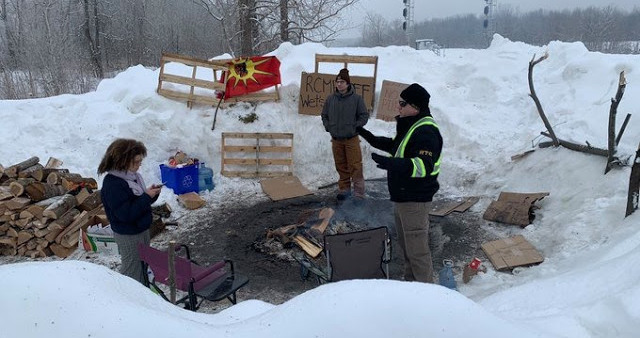
Kahnawake Mohawk Territory

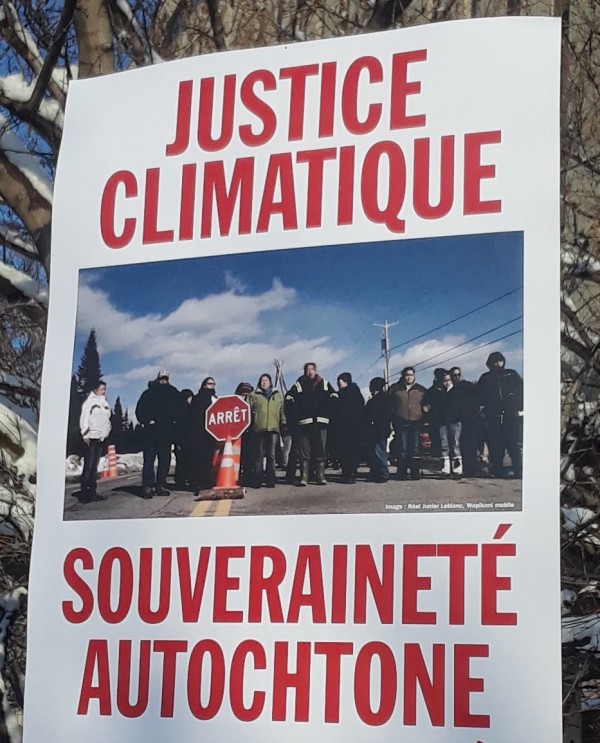
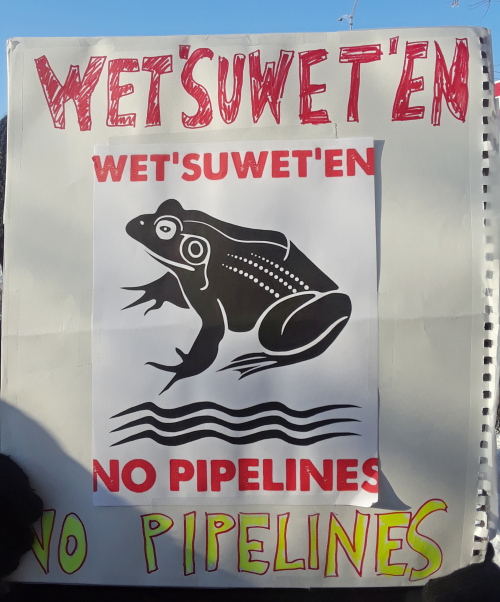
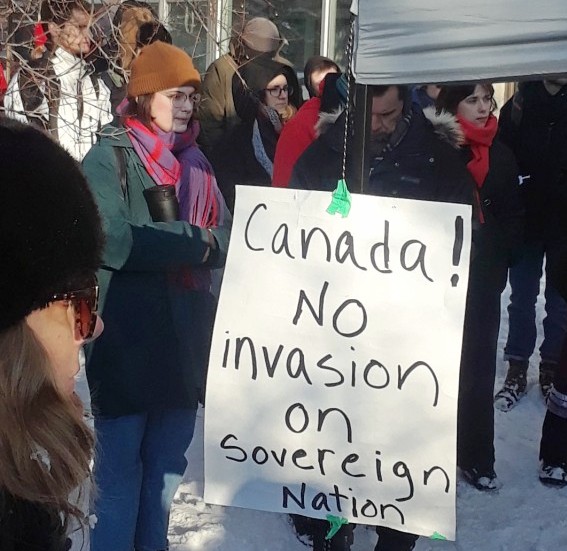
Rally outside Prime Minister Trudeau's riding office, Montreal, QC,
February 10, 2020.
Rimouski, QC
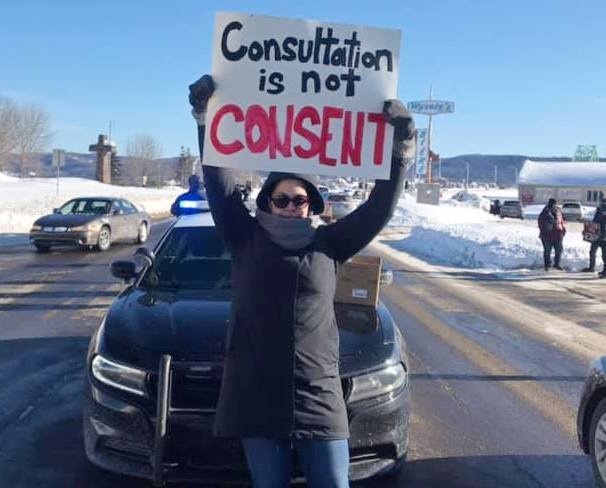
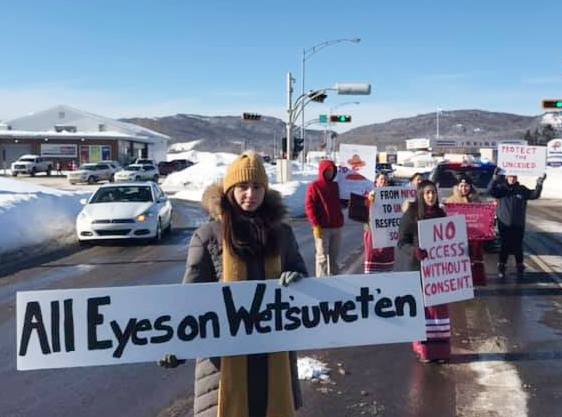
Listuguj, QC
Nova Scotia
Indigenous and non-Indigenous youth occupied
Halifax Liberal MP Andy Fillmore's constituency office on February 7.
On February 11, a demonstration blocked the Fairview Cove container
terminal in Halifax, and on February 12, Deputy Prime Minister Chrystia
Freeland's visit was greeted by protests at Halifax city hall and at
the Nova Scotia Premier's office, demanding she address the RCMP's
occupation of Wet'suwet'en territory.

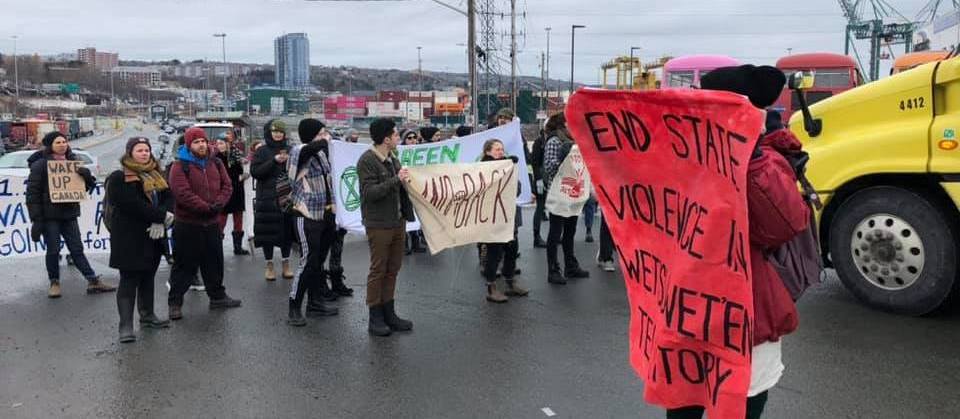
Fairview Cover container terminal, Halifax, NS, February 11, 2020

RCMP station, Antigonish, NS,
February 11, 2020
Newfoundland and Labrador
About 100 people rallied at Memorial University's
Signal Hill campus in St. John's on February 10, where Natural
Resources Minister Seamus O'Regan was set to speak.
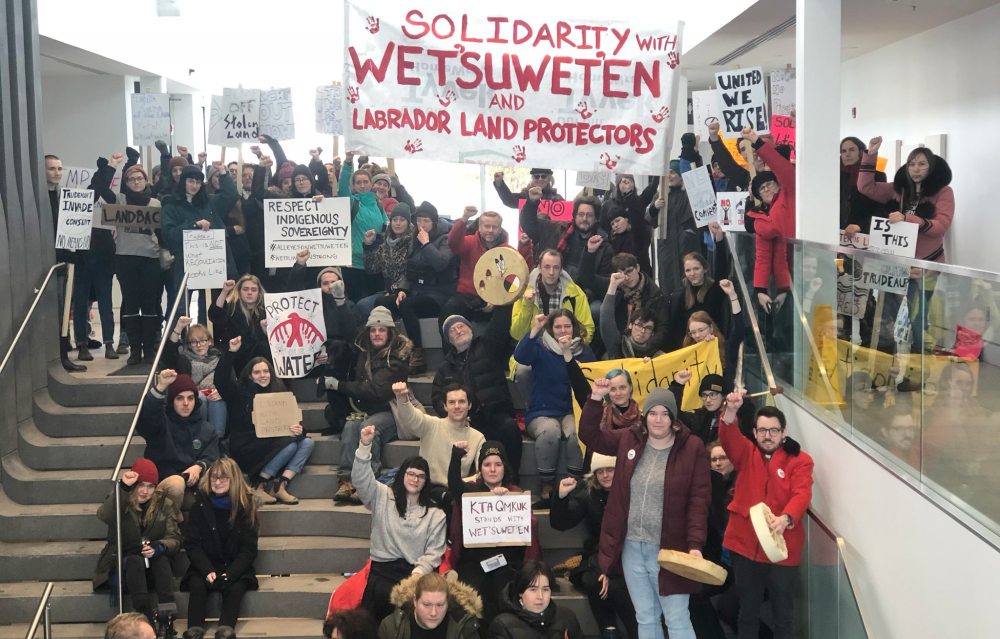
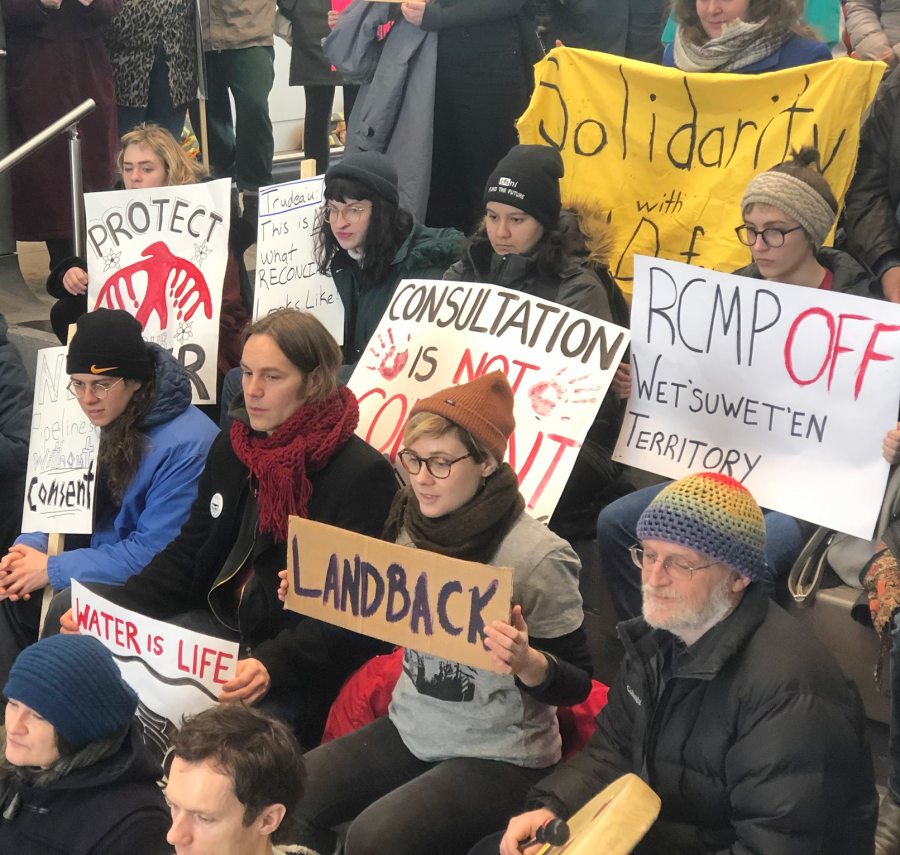

St. John's, NL
International Solidarity Actions

Washington DC, USA
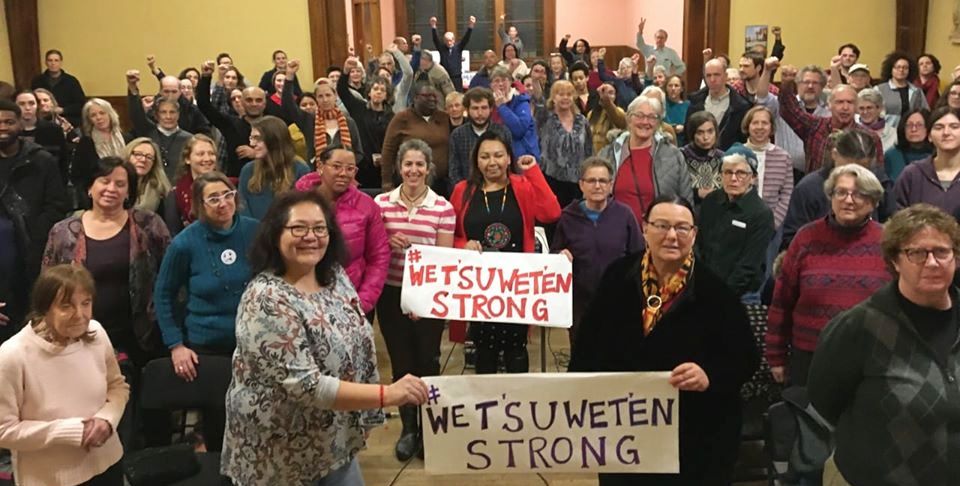
Boston, USA
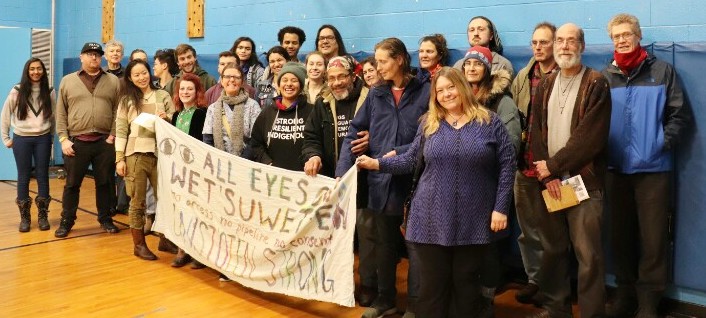
Ithaca, USA
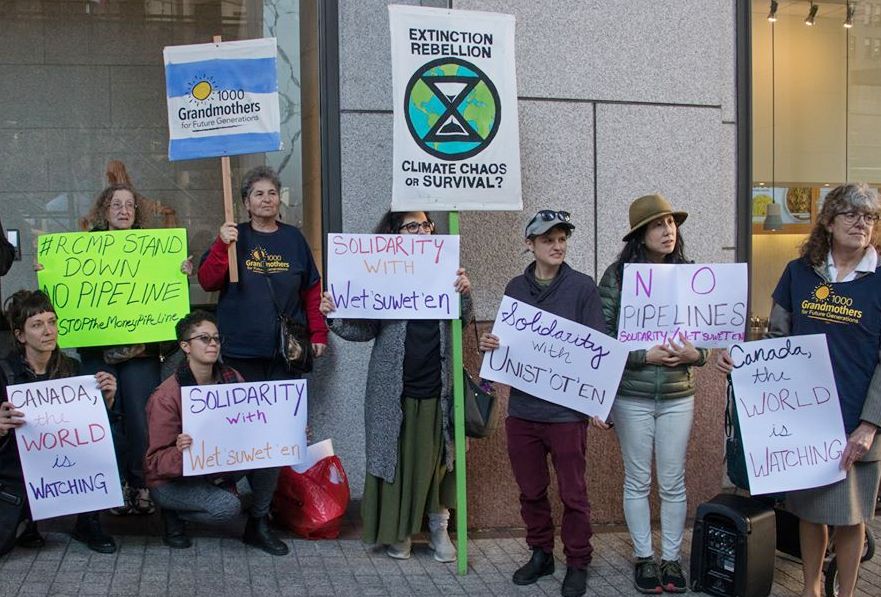
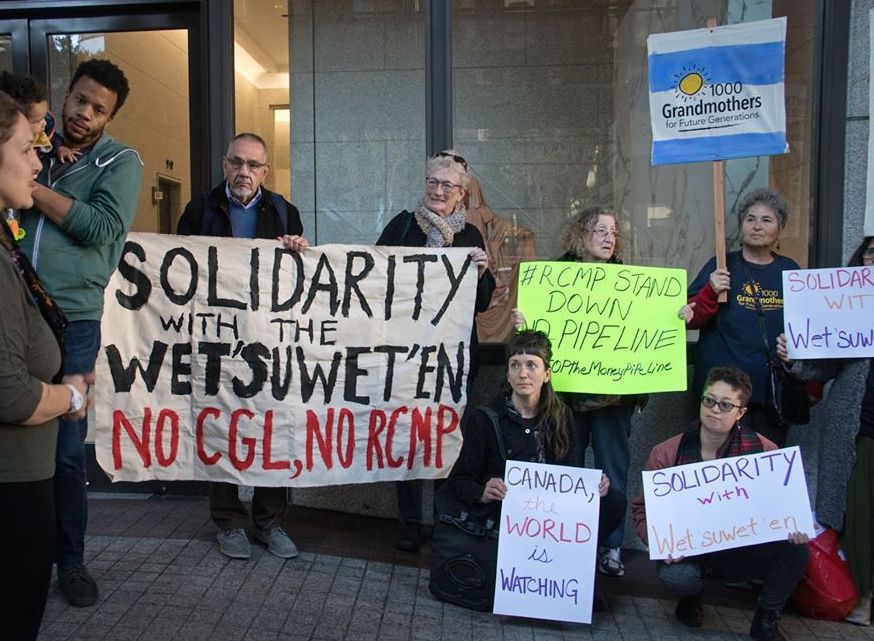
San Francisco, USA
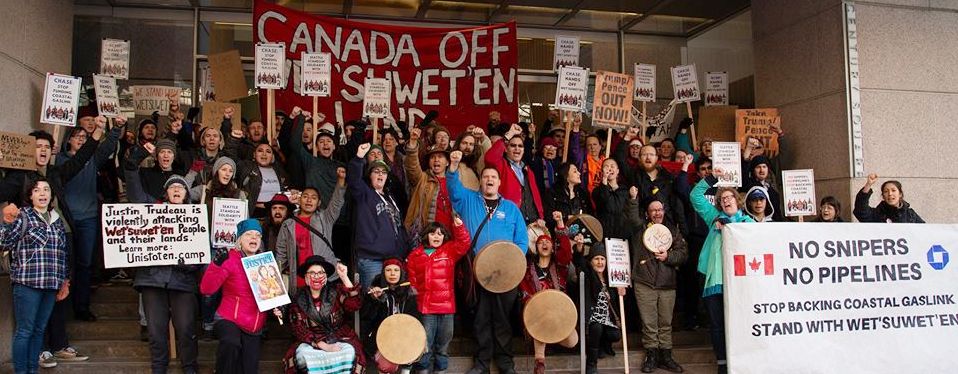
Seattle, USA
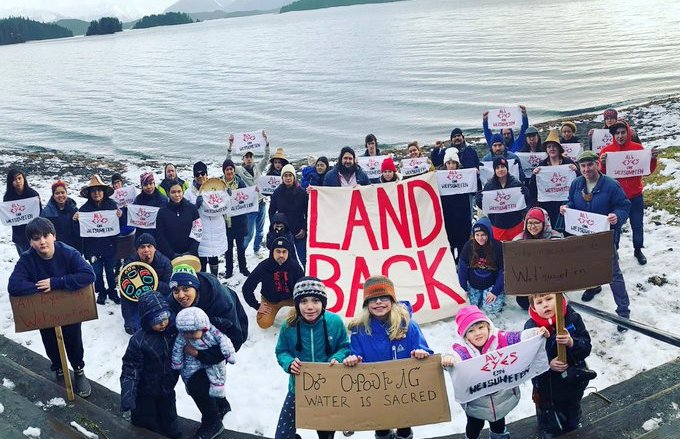
Juneau, USA
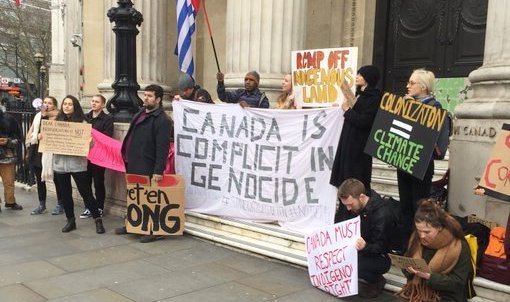
London, England
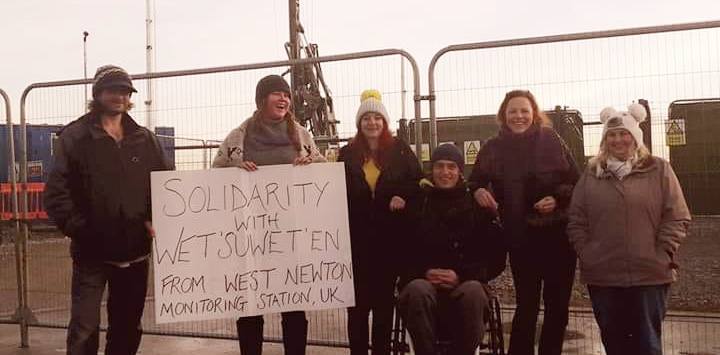
West Newton, England
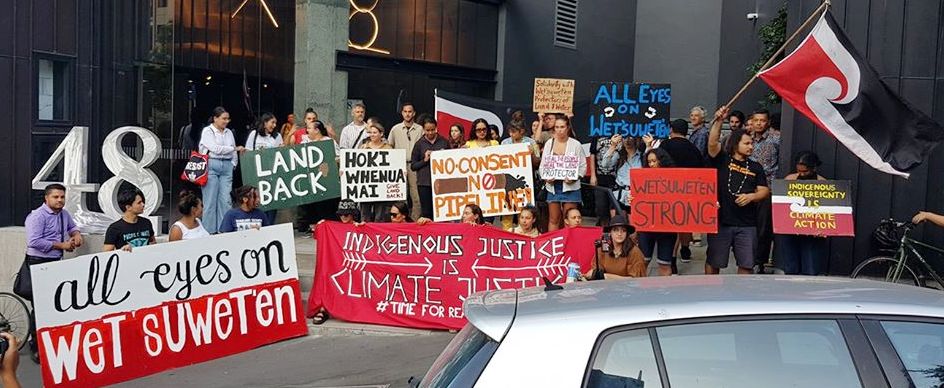
New Zealand
(Photos: TML, UBCIC, C. Smith, C. Hunt, T. Coste, C. Istace, Extinction Rebellion Rimouski, H. Tattrie, J. Speller, C. Marie, B.R. Amyot, R. Gamblin, Larsen, K. Goldberg, C. Carlson Swanson, Toronto Climate Justice, T. MacIntyre, W.A. Kwe, A. Jaffar, M. Elizabeth, S. Saunders, Teru, A. Munim, B. Low, p. Hockey, L. Lou, N. Knight, real people media, censored news, D. Smith, Noone Is Illegal, T. Tsang, M. Munro, Wetsuweten Solidarity DC, p. Hunter, 350 Seattle, Salmon State)
Workers Must Fight for a Resolution that
Defends the Rights of the Wet'suwet'en
and the Rights of All !

Mass action blocking rail tracks in Toronto, February 15, 2020.
Hysteria in the monopoly media about rail blockades and other actions that are disrupting transportation in support of the Wet'suwet'en land defenders has grown exponentially since Via Rail and CN announced they are shutting down services. On February 13, CN announced it was closing down its Eastern Canadian network, and on February 14, Via Rail announced it was cancelling most of its services Canada-wide. This led many media to predict catastrophe for the Canadian economy, and ramp up threats of secession in the West and of Canada breaking up, with the railway being some sort of symbol of Canadian unity. Calls for "government intervention" to forcefully remove the blockades are increasing.
The political crisis that has been triggered by the RCMP invasion, again, of Wet'suwet'en land and violation of the rights of the Wet'suwet'en to decide who can come on their territory and for what purpose, is presented as being of no importance to Canadians. The 'solution' that is being called for is to extend the police violation to all those who are taking a stand in solidarity with the Wet'suwet'en land defenders so as to get the trains moving again.
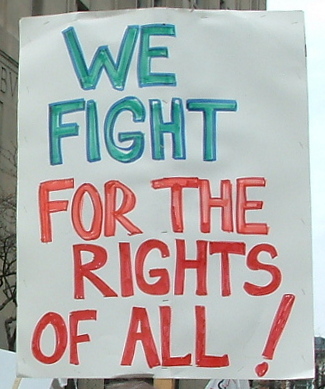 Workers are all
too familiar with the characterization of anyone who challenges the
dictate of those in power as being illegitimate, troublemakers,
criminals. Every day, workers defending their wages and working
conditions are vilified as criminals. The workers at the Regina Co-op
Refinery who are resisting the demands of the owners that they agree to
a significant reduction in pensions they previously negotiated have
been arrested and fined for taking actions to stop the company from
continuing production using management and scabs. Railway workers and
postal workers, amongst others, have repeatedly faced back-to-work
legislation when their employers needed state and police support to
impose unacceptable conditions on them.
Workers are all
too familiar with the characterization of anyone who challenges the
dictate of those in power as being illegitimate, troublemakers,
criminals. Every day, workers defending their wages and working
conditions are vilified as criminals. The workers at the Regina Co-op
Refinery who are resisting the demands of the owners that they agree to
a significant reduction in pensions they previously negotiated have
been arrested and fined for taking actions to stop the company from
continuing production using management and scabs. Railway workers and
postal workers, amongst others, have repeatedly faced back-to-work
legislation when their employers needed state and police support to
impose unacceptable conditions on them.
Underlying the hysteria about the effects of disruption to transportation services is the attempt to get the working class to side with the ruling elite who refuse to shed the old colonial relations and establish nation-to-nation relations with the Wet'suwet'en and other Indigenous nations.
Workers are not supposed to concern themselves with the state violence being used against Indigenous peoples; their only concern is supposed to be that their livelihood should not be impacted through layoffs and other means. Workers are alternately considered troublemakers and disrupters of rule of law and the national and regional economy when they wage mass actions in defence of their rights, and as bystanders when Indigenous nations and their allies wage mass actions to defend Indigenous rights such as is the case with the rail and other blockades.
What is hidden is the profound stake that workers have in pointing out that these events highlight the fact that the Canadian state and its police powers do not allow the relations between people and political authority to be sorted out, and that democratic renewal is the order of the day. Those who are advocating further violence by the state under the hoax of defending the economy, the rule of law, or Canadian unity, are defending the power and the privilege of the few and the whole colonial state structure that is depriving people of the power to control their lives.
While Canadian trade unions have scores of resolutions in defence of Indigenous peoples, these make sense only if they mean something when times get difficult and the economic and political status quo is being challenged.
Workers know what it means to be criminalized when one is waging struggles to win justice in a situation where all of the arrangements that are supposed to give you a voice and say have been wrecked to the benefit of global private interests. The situation calls for the Canadian and Quebec working class to take a stand in defence of the rights of the Wet'suwet'en Land Defenders, against the violence of the colonial state and for political solutions that favour the people.
Canada and BC Violate UN "Injunction"
While Lawful Protesters Arrested and
Threatened with Armed Force
While peaceful protesters are arrested from coast to coast, Canada's Minister of Transportation Marc Garneau calls the blockades in support of Wet'suwet'en land rights defenders illegal, citing the Railway Safety Act. He fails to mention that actions of the governments of Canada and British Columbia and the use and threatened use of force by the RCMP are themselves in violation of Canada's binding international law obligations and therefore "illegal." The protesters, on the other hand, are exercising their legal rights to peacefully and strongly object to serious violations of the rights of the Wet'suwet'en.
On December 13, 2019 a United Nations (UN) treaty monitoring body called on Canada to "halt construction ... of the Coastal Gas Link pipeline in the traditional and unceded lands of the Wet'suwet'en people," "immediately cease forced eviction of Wet'suwet'en peoples," "guarantee that no force will be used against Wet'suwet'en," and ensure that "the Royal Canadian Mounted Police and associated security and policing services will be withdrawn from their traditional lands." The UN body also called on Canada (which includes BC) to "prohibit the use of lethal weapons, notably by the [RCMP] against Indigenous peoples."
After years of Canada's failure to comply with recommendations of the UN Committee to End Racial Discrimination regarding the rights of Indigenous peoples, particularly in BC, the Committee issued its December decision urging Canada to incorporate free, prior and informed consent into domestic legislation and seek technical advice from the UN.
Instead, Canada, while seeking a seat on the UN Security Council, is ignoring this urgent UN decision and is again directing and allowing the use of force to seize unceded traditional lands, evict Indigenous people from their lands, and deprive protesters and land defenders of their fundamental rights to liberty and to engage in peaceful protests.
 Protesters across
Canada are objecting to the repetition of the original colonial
seizures of Indigenous lands and the accompanying trampling of
Indigenous people's inherent rights to liberty, livelihood, and
dignity. The grave consequences of this historic land grabbing and
associated injustices persist to this day.
Protesters across
Canada are objecting to the repetition of the original colonial
seizures of Indigenous lands and the accompanying trampling of
Indigenous people's inherent rights to liberty, livelihood, and
dignity. The grave consequences of this historic land grabbing and
associated injustices persist to this day.
Now, in 2020, Canada and BC cite "the rule of law" as supporting enforcement of laws and decisions that purport to override international laws that protect the rights of both Indigenous peoples and protesters. These international human rights laws have been binding on Canada and BC for more than half a century.
The RCMP arrests protesters and deprives them of their liberty for alleged violations of a civil injunction of the BC Supreme Court in favour of a corporation while Canada and BC violate the UN "injunction" with impunity. These actions by Canada, BC and the RCMP are contrary to the rule of law upon which the protesters and land defenders insist.
Lawyers' Rights Watch Canada (LRWC) is a committee of lawyers and other human rights defenders who promote international human rights, the rule of law and the integrity of legally systems globally through advocacy, education and research. LRWC is an NGO in Special Consultative Status with the Economic and Social Council of the UN.
Federal Court of Appeal Decision on
Trans Mountain Pipeline Expansion
Is Illegal and Unjust
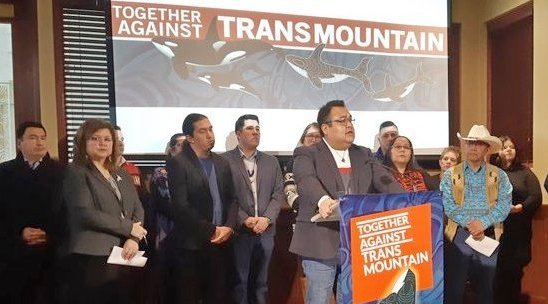
Chief Don Tom, Vice-President of UBCIC speaks at February 4, 2020,
Vancouver press conference following the dismissal of the court
challenge against approval of the Trans Mountain pipeline expansion
project. (UBCIC)
The Federal Court of Appeal ruling February 4, which dismissed the court challenge filed by the Coldwater Indian Band, Squamish Nation, Tsleil-Waututh Nation, and a coalition of seven Stó:l villages to the approval of the Trans Mountain pipeline expansion project (TMX), is illegal and unjust.
Put simply, the Crown has no legal jurisdiction over the Indigenous peoples in their unceded territory. These are sovereign Indigenous nations and peoples whose status is politically equal to Canada, and is recognized as such in international law, for example, in the United Nations Declaration on the Rights of Indigenous Peoples.
The Federal Court of Appeal ruling is unjust because the court restricted the case of the Indigenous plaintiffs -- who originally numbered twelve nations and groups -- to just six and restricted the legal arguments to address only whether the "Government of Canada had adequately fulfilled its duty to consult with Indigenous peoples." This means, for example, all the meticulous work the Tsleil-Waututh Nation did in preparing to demonstrate in court the damage the pipeline would cause to the natural and social environment, was not considered.
This is the second time that Indigenous peoples from British Columbia have taken their case to stop the TMX to the Federal Court of Appeal. The first time, in May 2018, the court ruled in their favour, quashing approval of the project and requiring the federal government do a more thorough job of consulting the 125 Indigenous groups and bands along the proposed route of the project.
In their unanimous 2020 ruling the three judges stated: "This was anything but a rubber-stamping exercise. The end result was not a ratification of the earlier approval, but an approval with amended conditions flowing directly from renewed consultation." They deemed it "All very much consistent with the concepts of reconciliation and the honour of the Crown." The court further ruled, "The case law is clear that although Indigenous peoples can assert their uncompromising opposition to a project, they cannot tactically use the consultation process as a means to try and veto it." In other words, the court clearly does not recognize the sovereign jurisdiction of the Indigenous peoples on their unceded lands.
While the Crown -- represented by the Canadian colonial state, its governments, courts, police and military -- can try to impose their agenda through force, as in the case of the TMX or Coastal GasLink pipeline, and the courts can uphold the agenda of the gas and oil multinationals "legally," it still does not make it right or just or legal within the framework of Indigenous or international law. The political high ground here is held by the Indigenous peoples who are standing up for their rights and sovereignty, fighting for the well-being of all Canadians and demanding that Canada recognize their right to self-determination.
Speaking on Bloomberg Business News following the ruling of the Federal Court of Appeal, Kukpi7 Judy Wilson, Secretary-Treasurer of the Union of BC Indian Chiefs stated that not only was the "consultation" the Liberal government did the second time around flawed and "dismissive," but the "worrisome thing about this case was that [the Federal Court of Appeal] was dismissive of Indigenous peoples' rights, Indigenous peoples' knowledge and also the Indigenous peoples' laws."
Kukpi7 Wilson pointed out in the interview that the system that Canada imposed on the Indigenous peoples through the Indian Act cannot be the basis of resolving conflicts between Indigenous peoples and Canada. She noted that Indigenous peoples are increasingly affirming their sovereignty and rights as they turn to their own Indigenous laws and systems that have served them well through time. For example, she noted that Indigenous peoples consider they have a sacred duty as stewards of the lands and waters to ensure the well-being of the natural and social environment for future generations.
Following the decision of the Federal Court of
Appeal, the Indigenous plaintiffs stated that they will appeal the
decision to the Supreme Court while also stepping up the resistance of
the various Indigenous peoples and the Canadian people to take the
political fight further in tandem with the legal battle.
Women's Memorial Marches Honour the
Lives of Indigenous Women and Girls
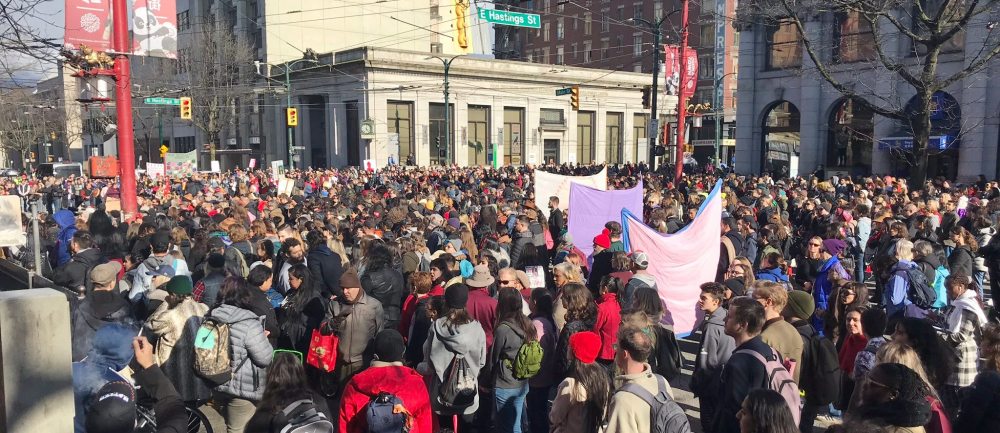
29th Women's Memorial March, Vancouver, February 14, 2020.
Memorial marches were held across Canada on February 14 to honour the lives of the missing and murdered Indigenous women and girls and to call for an end to the violence against them.
Thousands took part in the 29th annual memorial march in Vancouver which started at the Carnegie Centre in Vancouver's Downtown Eastside. This march has taken place every year on Valentine's Day since 1992. Event organizer Evelyne Youngchief said the march this year will honour over 970 women in the Downtown Eastside who have gone missing or been killed. Along the route, stops were made at a number of the locations where women were last seen or were murdered, with ceremonies being performed in their honour.
Memorial marches, vigils and other events also took place in many cities and towns, including Victoria, Calgary, Edmonton, Winnipeg, Windsor, Toronto and Montreal. Many participants in the marches and vigils across the country bore in mind recent images of the RCMP tearing down the red dresses at the Unist'ot'en camp that had been hung to hold the spirits of missing and murdered Indigenous women and girls and two spirit people as they arrested Wet'suwet'en Land Defenders and their chiefs in a most disrespectful and brutal way.
In Toronto, hundreds joined in the 15th annual Strawberry Ceremony outside Toronto Police Headquarters. Family members spoke of their loved ones who have been killed or gone missing. Other speakers called for an end to the conditions faced by Indigenous peoples in Canada that are rooted in the colonial racist policies of the state and its police. They pointed out that the numbers of missing and murdered women continue to increase each year and demanded the indifference and abuse by governments at all levels stop. A march and a round dance that shut down a major intersection followed the ceremony.
More than 80 people gathered at the Human Rights Monument in Ottawa. The rally began with a traditional prayer by a Native elder. Some family members spoke in remembrance of loved ones and pointed out that even though the National Inquiry on Missing and Murdered Indigenous Women and Girls has been completed and its report issued eight months ago, Indigenous women are still going missing and being murdered. The Canadian government has done nothing to implement any of the report's 231 Calls for Justice, speakers pointed out, and must be held to account. Placards in the rally carried portraits of some of the missing and murdered women and girls and expressed some of the Calls for Justice.
In late 2019, a Families of Sisters in Spirit researcher estimated that since the National Inquiry had begun its mandate in September 2016, at least 140 women and girls had died as a result of homicides, suspicious deaths and deaths in police custody or while in the care of the child welfare system.
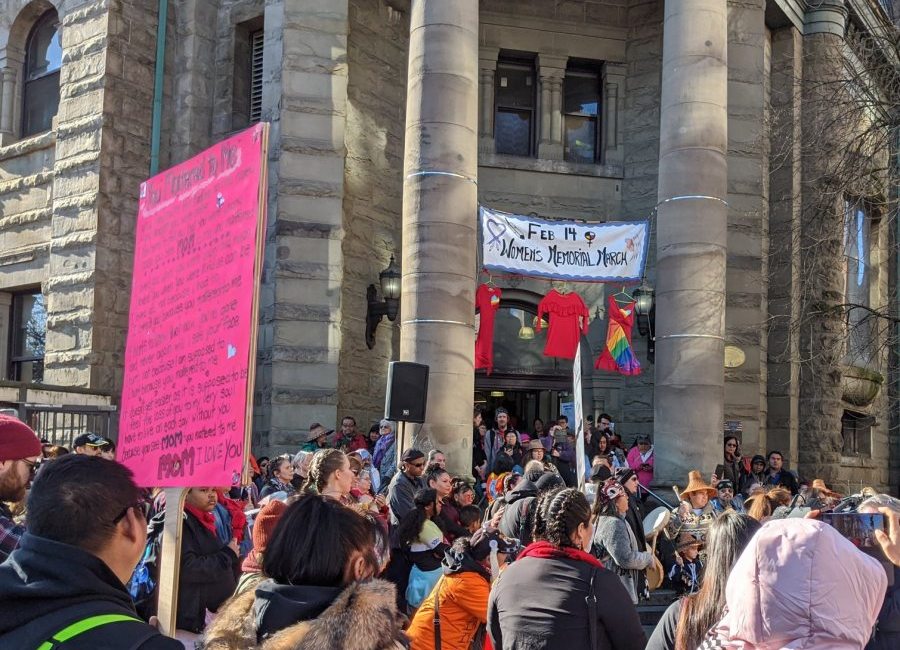

Vancouver, BC
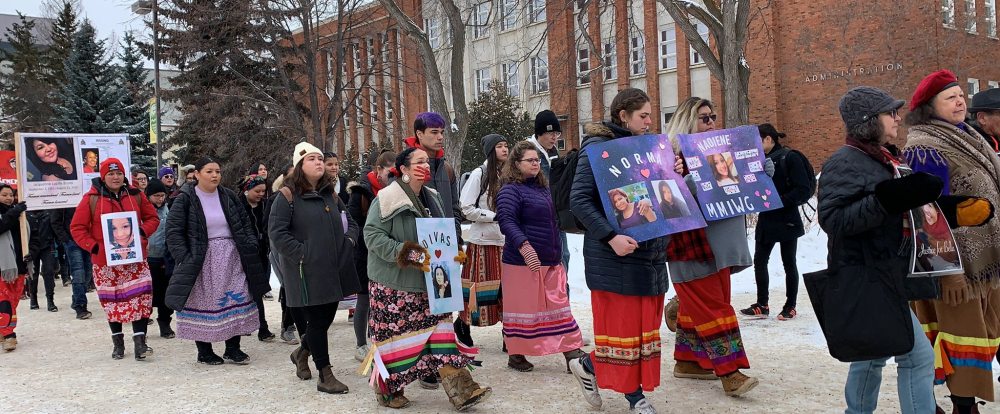
Edmonton, AB
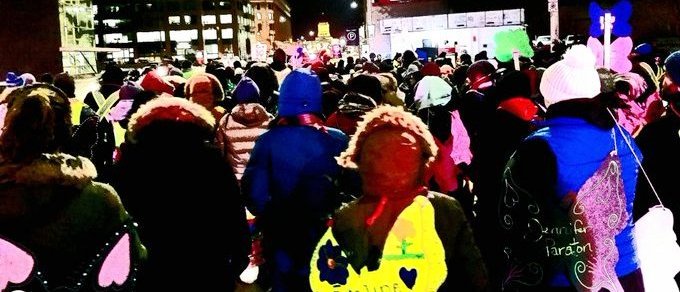
Winnipeg, MB

Windsor, ON
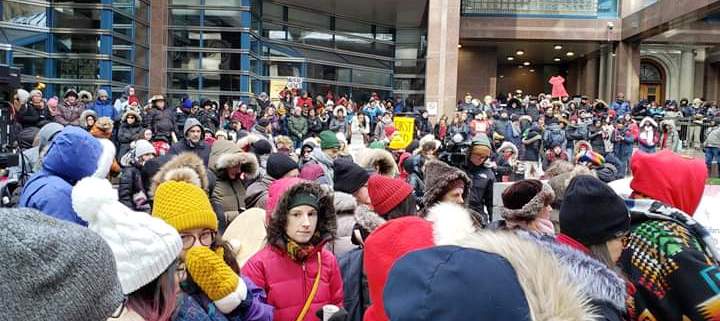


Toronto, ON
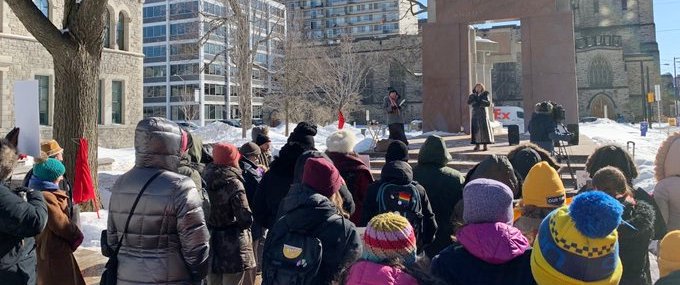
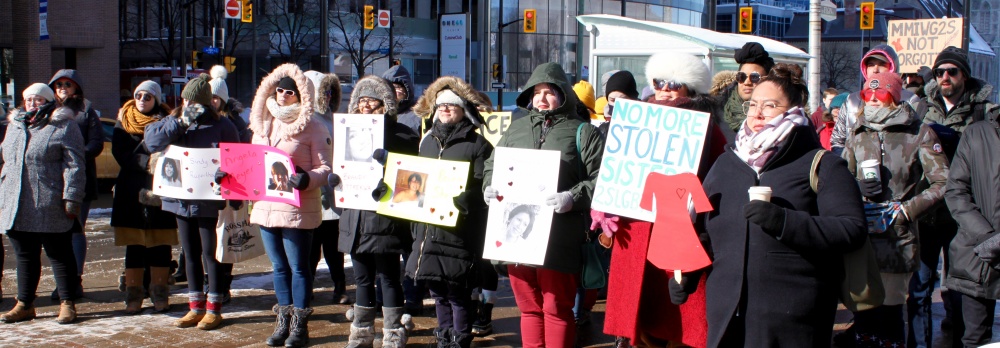
Ottawa, ON
(Photos: TML, MVISS, R. Artiga, D. Bryant, M. Beyenne, M. Horodyski, P.J. Paul, End Violence Against Women Network)
For Your Information
Letter to Civilian Review and Complaints Commission for the RCMP
Re: Policy Complaint and Public Interest Investigation Concerning RCMP Exclusion Zone and RCMP Operations on Morice West Forest Service Road
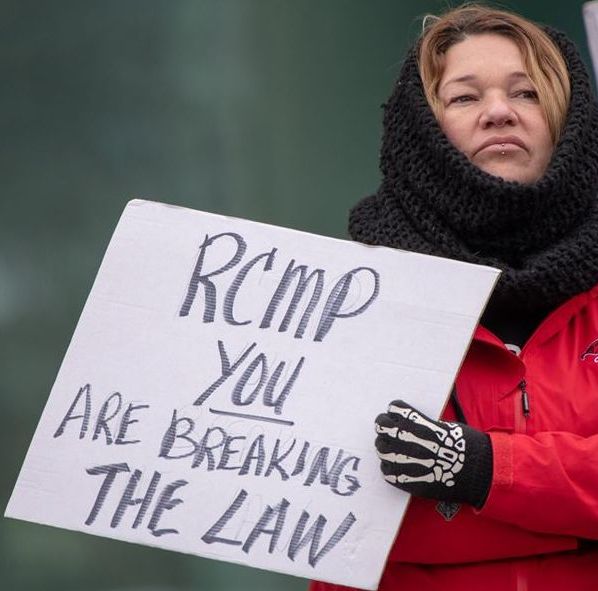 On January 29,
2020, the British Columbia Civil Liberties Association, the
Wet'suwet'en Hereditary Chiefs, and the Union of BC Indian Chiefs wrote
to the Commission to initiate a policy complaint and public interest
investigation under the Royal
Canadian Mounted Police Act regarding the improper and
unlawful actions of the Royal Canadian Mounted Police ("RCMP") in
implementing and enforcing a checkpoint and exclusion zone on Morice
West Forest Service Road ("Morice West FSR") in Wet'suwet'en territory.
The complaint and call for investigation were also supported by West
Coast Environmental Law and Pivot Legal Society.
On January 29,
2020, the British Columbia Civil Liberties Association, the
Wet'suwet'en Hereditary Chiefs, and the Union of BC Indian Chiefs wrote
to the Commission to initiate a policy complaint and public interest
investigation under the Royal
Canadian Mounted Police Act regarding the improper and
unlawful actions of the Royal Canadian Mounted Police ("RCMP") in
implementing and enforcing a checkpoint and exclusion zone on Morice
West Forest Service Road ("Morice West FSR") in Wet'suwet'en territory.
The complaint and call for investigation were also supported by West
Coast Environmental Law and Pivot Legal Society.
[We are] writing to you today on behalf of the BCCLA and UBCIC regarding the ongoing improper and increasingly unlawful actions of the RCMP on Morice West FSR in Wet'suwet'en territory. We ask the Commission to treat this letter as an urgent update to our previous complaint and request to initiate a policy complaint and public interest investigation in the matter. The policing of Indigenous land defenders in Wet'suwet'en territories is a matter of significant public interest.
On February 6, 2020, the RCMP formalized an exclusion zone at the 27-kilometre mark on the Morice West FSR. On February 7, 2020 the exclusion zone was moved to the 4-kilometre on the Morice West FSR and severe access restrictions have been imposed, including a prohibition on access and mobility on the road impacting Wet'suwet'en Hereditary Chiefs, Wet'suwe'ten Nation members, invited guests, media outlets, and legal observers.
We stress to the Commission that the overbroad and arbitrary exclusion zone lies outside the scope of the injunction order. We are highly alarmed at the expanding nature of the RCMP exclusion zone, granting the RCMP discretionary, unreasonable and unjustified powers to:
1. Unlawfully detain and arrest people who are inside the arbitrary and ill-defined exclusion zone but who are not actually in breach of the injunction.[1]
2. Prohibit access and impede the movement of Wet'suwet'en people, their invited guests, and the public on Morice FSR and in the exclusion zone.[2]
3. Seize personal property within the exclusion zone.[3]
4. Severely curtail the constitutionally-protected right to freedom of the press.[4]
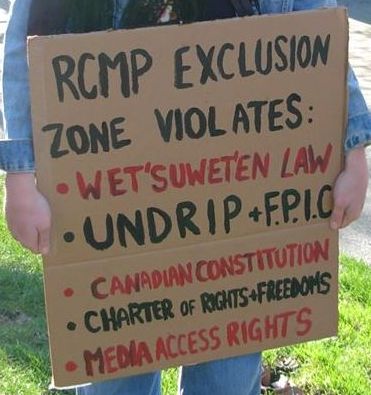 There is
absolutely no legal precedent nor established legal authority for such
an overbroad policing power associated with the enforcement of an
injunction. The implementation and enforcement of the RCMP
exclusion zone in Wet'suwet'en territory is unlawful. RCMP public
statements reference enforcement of the injunction order in order to
justify the exclusion zone; however, no such provisions are explicitly
made in the enforcement order issued on January 7, 2020. The RCMP are
wilfully reinterpreting the enforcement order in order to extend their
policing powers. Attempting to clear an undefined area bordering more
than 60 km of roadway of all people and inhabitants is an unreasonable
exercise of the discretion granted to police under the enforcement
order. The arbitrary RCMP exclusion zone and overbroad access
restrictions are completely unjustified and unlawful, and constitute a
serious violation of Indigenous rights and jurisdiction, severe
deprivation of individual liberty interests, and egregious impairment
of Charter-protected
rights. We trust the Commission will appreciate the urgency of this
issue and launch a full public investigation into the matter.
There is
absolutely no legal precedent nor established legal authority for such
an overbroad policing power associated with the enforcement of an
injunction. The implementation and enforcement of the RCMP
exclusion zone in Wet'suwet'en territory is unlawful. RCMP public
statements reference enforcement of the injunction order in order to
justify the exclusion zone; however, no such provisions are explicitly
made in the enforcement order issued on January 7, 2020. The RCMP are
wilfully reinterpreting the enforcement order in order to extend their
policing powers. Attempting to clear an undefined area bordering more
than 60 km of roadway of all people and inhabitants is an unreasonable
exercise of the discretion granted to police under the enforcement
order. The arbitrary RCMP exclusion zone and overbroad access
restrictions are completely unjustified and unlawful, and constitute a
serious violation of Indigenous rights and jurisdiction, severe
deprivation of individual liberty interests, and egregious impairment
of Charter-protected
rights. We trust the Commission will appreciate the urgency of this
issue and launch a full public investigation into the matter.
Sincerely,
Harsha Walia,
Executive Director
On behalf of the B.C Civil Liberties Association
Grand Chief
Stewart Phillip, President
Chief Don Tom, Vice-President
Kukpi7 Judy Wilson, Secretary-Treasurer
On behalf of the Union of BC Indian Chiefs
Notes
Since the RCMP arbitrarily moved the exclusion zone to the 4-km mark, the 27-km camp now falls within the arbitrary exclusion zone but is well outside the scope of the injunction itself. These arrests and contempt charges are therefore unlawful.
2 BC
RCMP press release, February 6, 2020.
3 RCMP towed vehicles located within the exclusion zone but outside the injunction area.
4 Statement by Canadian Association of Journalists: Ricochet journalist detained for eight hours while covering RCMP raid.
(Photos: C. Hunt, K. Goldberg)
Gidimt'en Media Statement
Freda Huson (third from left), and six others arrested at Unist'ot'en camp, following their release, late on February 10, 2020. (unist'ot'en camp)
Wet'suwet'en Camps Reoccupied, Heavy RCMP Presence is Ongoing
Reconciliation is dead. The events of the past week on Wet'suwet'en territories have been an extreme demonstration of colonial violence, approved in contravention of Wet'suwet'en, Canadian and international law.
RCMP arrested 28 land defenders and matriarchs during the enforcement of the interlocutory injunction approved by Justice Church .... One person, refusing to acknowledge colonial law, remains in custody and will be appearing in court on February 21, 2020 in Prince George. Charges are pending as CGL has requested Crown intervention. The rest of the land defenders are to appear before the Supreme Court in Prince George in late April 2020.
In response to discretionary, unreasonable and unjustified police action, the BC Civil Liberties Association [along with the Union of BC Indian Chiefs -- TML Ed. note] has launched a policy complaint and public interest investigation aimed at RCMP conduct. The RCMP illegally arrested people encamped outside of the injunction zone, and people hiding from officers with assault rifles off the roads mentioned in the injunction. The blatant disregard and disrespect shown by the RCMP to Wet'suwet'en, Canadian and international law is now the subject of investigation.
While the admittedly illegal exclusion zones have been lifted, there is still an extreme RCMP presence on Wet'suwet'en land. We expect them to heavily guard and facilitate CGL access to unceded territories without Free, Prior and Informed consent from the Hereditary Chiefs. The eviction notice to CGL given on January 4, 2020 still stands and will continue to be enforced with the full power and jurisdiction under Wet'suwet'en law.
We encourage all supporters to stand strong in solidarity with this struggle.
Unist'ot'en Matriarchs Arrested
A convoy of armed RCMP tactical units has invaded sovereign and unceded Unist'ot'en Territory to enforce Coastal GasLink's injunction. Our Unist'ot'en Matriarchs and lands defenders have been forcibly removed off their lands.
Unist'ot'en Matriarchs Freda Huson (Chief Howihkat), Brenda Michell (Chief Geltiy), and Dr. Karla Tait have been forcibly removed off our territories and arrested. Our matriarchs were arrested while holding a ceremony to call on our ancestors and to honour missing and murdered Indigenous women and girls. We, the Unist'ot'en, know that violence on our lands and violence on our women are connected. During ceremony, we hung red dresses to remember the spirits of the murdered women, girls and two spirit people taken from us. We were holding a cremation for the Canadian Indigenous Reconciliation industry as the RCMP battered through the gates. Land defenders, including Victoria Redsun (Denesuline), Autumn Walken (Nlaka'pamux), and Pocholo Alen Conception have also been arrested.
Unist'ot'en condemns these violent, colonial arrests and stark violations of Wet'suwet'en law, Canadian law, and of the United Nations Declaration on the Rights of Indigenous Peoples (UNDRIP). This is also a clear violation of the recent directive from the UN Committee on Racial Discrimination (CERD) requiring Canada to halt the Coastal GasLink pipeline project and withdraw RCMP from our territory in order to avoid further violations of Wet'suwet'en, constitutional, and international law.
We, as Wet'suwet'en, have never ceded our sovereign title and rights over the 22,000 square kilometres of our land, waters, and resources within our Yintah. Our 'Anuc niwh'it'ën (Wet'suwet'en law) and feast governance systems remain intact and continue to govern our people and our lands. We recognize the authority of these systems. The Wet'suwet'en Hereditary Chiefs are the Title Holders, and maintain the authority and jurisdiction to make decisions on unceded lands.
Our Wet'suwet'en Territory is divided into five clans and 13 house groups. Each clan within the Wet'suwet'en Nation has full jurisdiction under our law to control access to their respective territories. We have governed ourselves sustainably since time immemorial. The Unist'ot'en (Dark House) is occupying and using our traditional territory as we have for centuries. Our homestead is a peaceful expression of our connection to our territory and demonstrates the continuous use and occupation of our territories in accordance with our governance structure. Our Unist'ot'en Yin'tah is a place of healing. It is home to Wet'suwet'en people seeking refuge from colonial trauma. People recovering from addiction. People reconnecting with the land.
We have the strength of our ancestors within us. We have the solidarity of our Indigenous relatives and allies with us. We have the power of people shutting down railways, highways, ports, and government offices all around this country. Thank you to people all around this planet making our struggle your struggle. The flames of resistance and the resurgence of Indigenous land reclamation give us strength. We know our neighbours and relatives are with us. We know the two-leggeds and the four-leggeds are watching over us. These arrests don't intimidate us. Police enforcement doesn't intimidate us. Colonial court orders don't intimidate us. Men in suits and their money don't intimidate us. We are still here. We will always be there. This is not over.
(Photos: unist'ot'en camp)
(To access articles individually click on the black headline.)
Website: www.cpcml.ca Email: editor@cpcml.ca
